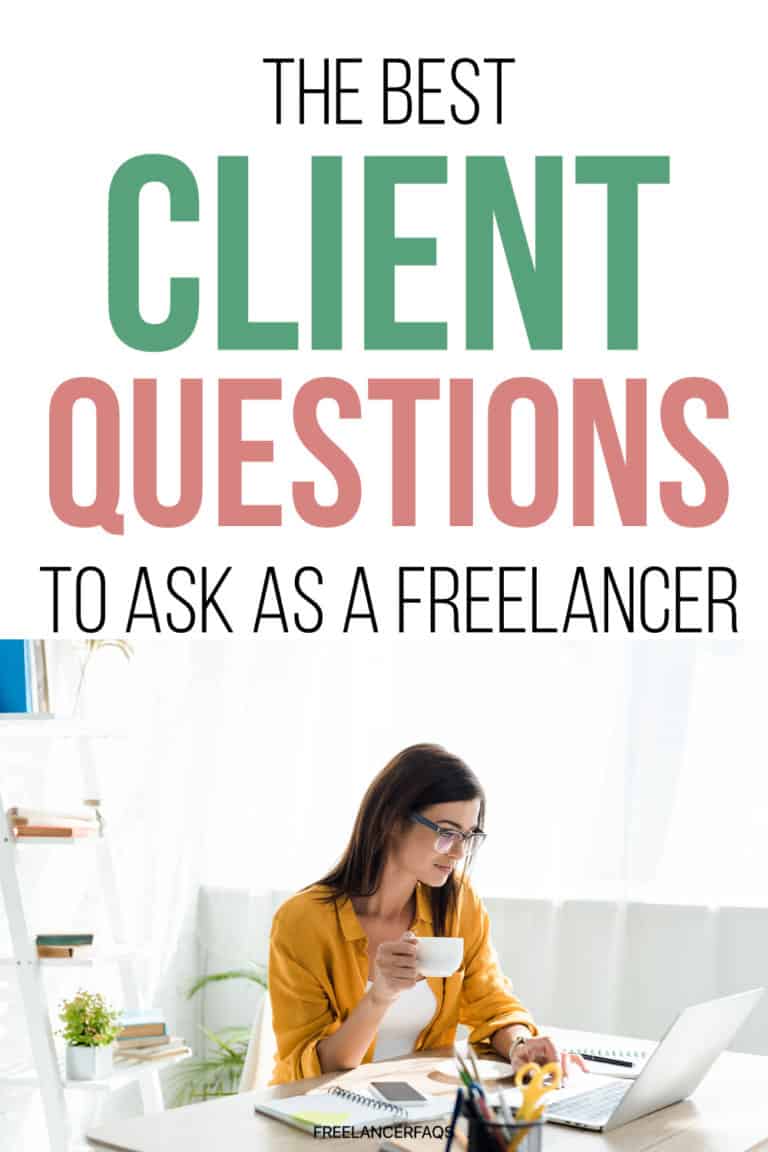One of the best things about being a freelancer is that you can pick and choose who you work with.
Finding your ideal clients is much easier when you are able to ask them questions beforehand that will indicate if they are going to be a good fit.

Even if a client is willing to pay a lot of money for a project, it’s not going to be worth it if they are a nightmare to work with.
Why You Should Ask Client Interview Questions
There are two ways to ask questions to clients, during the initial phase before you actually sign on to work together and during the offboarding phase to determine what you could have done differently or better to provide them with the best service possible.
In this post I will be focusing on the client interview questions that you should be asking potential clients before you start to work together.
The easiest way to do this is to build it into your already established systems and let your clients know in advance that you use onboarding and offboarding question sessions to ensure you are both a good fit for one another and to learn how and where to improve.
Just like you are helping your clients to take their customers on a journey, you need to take your potential and established clients on a journey as well.
You can then use this information to tweak and improve your client’s experiences no matter if you are working by yourself or on a team.
No matter how big or small the business, asking specific questions prior to accepting a job will help to ensure a smoother process for all involved.
Get to Know Your Clients
I’m sure we have all experienced having to go through a job interview.
It’s the same basic types of questions, which are used to ensure that you are the right candidate for the position.
As a freelancer, not only are your potential clients interviewing you, checking out your portfolio and references, but you also should be interviewing them to make sure they are a good fit for you to work with.
As I stated previously, while the paycheck might be nice, if you hate your clients, then you are going to hate what you are doing too.
Don’t sacrifice your happiness and your reputation for a crappy client.
Think about this for a moment.
First of all, you can’t make everyone happy.
There are some people in this world that it doesn’t matter the circumstances, nothing is ever good enough.
If you happen to have one of those types of people for a client, they can very quickly ruin your reputation.
Bad news spreads quickly and you don’t want a dissatisfied client (even if you did everything they wanted and went above and beyond) to tell everyone they know how terrible you are to work with.
You want your clients to love you!
You want them to tell everyone they know that they too should work with you because you are such an awesome person to work with and your work is incredible.
So, make sure that you are interviewing your potential clients just as much, if not more, than they interview you.
Client Interview Questions
 Below is a list of questions that you should ask every potential client before signing on to work with them.
Below is a list of questions that you should ask every potential client before signing on to work with them.
Let’s start simple…
1. Have you ever worked with freelancers before?
This might sound like an obvious first question, but it is an important one.
Clients that have worked with freelancers might be great but they might also be a nightmare to work with. They may be basing their expectations of your work off of previous freelancers they have worked with.
If you are working with someone who has never worked with a freelancer before, you might find they have a need to micromanage you or give you very little direction when you need it.
Asking this as the first question can also help to influence additional questions you might ask.
2. What type of project are you looking to have me work on?
Another simple yet critical question to ask your potential clients.
You want to be sure that you are capable of working on their project and that it is something you want to work on.
Whether you are asking for a broad overview of the project or finer details, you need to know if what they are looking for fits into your scope.
Speaking of scope…
3. What is the scope of the project?
Talking about scope of the project is a great way to get into the finer details of the work.
Let’s say a potential client comes to you asking you to ghostwrite a non-fiction book about homesteading.
While this sounds like something you would love to work on, you need to know a few more things.
- Is there already an outline or do you need to create that?
- What type of research is involved in the writing process?
- Will you also need to edit and format the book?
- Are they looking for a certain number of pages or word count?
- Are they looking for a one-off project or to build a portfolio of books?
4. What goals are they trying to achieve with this project?
Determining the goals of the project is a highly important question as it is a great way to see if you are going to be a good fit for the project.
This can help you to determine your pricing structure, and will help you to approach the client and their project more effectively.
Let’s refer back to the ghostwriting example.
If you know that they are only looking for a one-off project then you might want to price the project higher whereas if they are looking to work with someone to create a portfolio of books, then you might price lower for consistent work.
5. When does the project need to be completed?
A simple question used to gauge if you have the time to complete the project to the best of your ability in a timely manner. This can also factor in if you have other client workloads that you are handling.
6. What is the project’s budget?
There’s a lot of debate as to whether freelancers should advertise their pricing.
If you do advertise your pricing anywhere, then you are locked into that pricing.
If you don’t and have a discussion as to what their budget is, then you have a little more flexibility to price your work accordingly.
Asking about the project’s budget also gives you a good idea if they are serious about working with freelancers.
Serious clients will have a budget in mind when they speak with freelancers.
If they are tight lipped about a budget or don’t have one, that can be a huge red-flag that they are tire kickers or are going to try and micromanage everything you do.
Never quote a price or estimate for a client until you are fully aware of the scope of the project, you understand the client’s end goals, and what the project will fully entail. This also allows you to price on value rather than just time worked.
This can be an uncomfortable discussion, but it doesn’t have to be. Practice and be confident in the value that you offer clients.
7. What are your company’s long term goals?
Knowing what the long term goals of the company are can help you to determine if you are the right fit for the job.
Companies hire freelancers to help them achieve their end goals.
Whether it’s to increase sales for a specific product, get more eyes on their website, or grow their email subscribers, all of these things can have an impact on the project you are being hired for.
Being an outstanding freelancer isn’t just about doing good work, it’s about being able to truly listen to a client and be able to see the big picture.
This can also be a great way to cross-advertise additional skills you might have to your client.
8. How will payments be handled?
This can be a very scary question for new freelancers to ask.
However, it’s better to get it all figured out before signing any contracts.
How they are going to pay you is just as important as what they will be paying you.
Are there milestone payments?
Do you only get paid on a certain day of the month after a project is complete?
Are they using a payment processor like Venmo or PayPal?
This is something to know in advance so there aren’t any difficulties with the payment later on and so that you don’t get yourself involved in anything that is more trouble than it’s worth.
9. This is my process, does that work for you?
Just as clients have their own way of working, so do freelancers.
You need to have certain boundaries to keep a good work life balance and know that your clients are not going to be breathing down your neck or micromanaging your every move.
Perhaps you don’t work on Saturdays after noon and never on Sundays.
This is something that would be helpful for your clients to know if they are expecting you to work those days.
You can speak to them about your working process and how you plan to work on their project specifically.
Anything Else?
Close out the conversation by asking them if there is anything else they would like you to know.




Leave a Reply